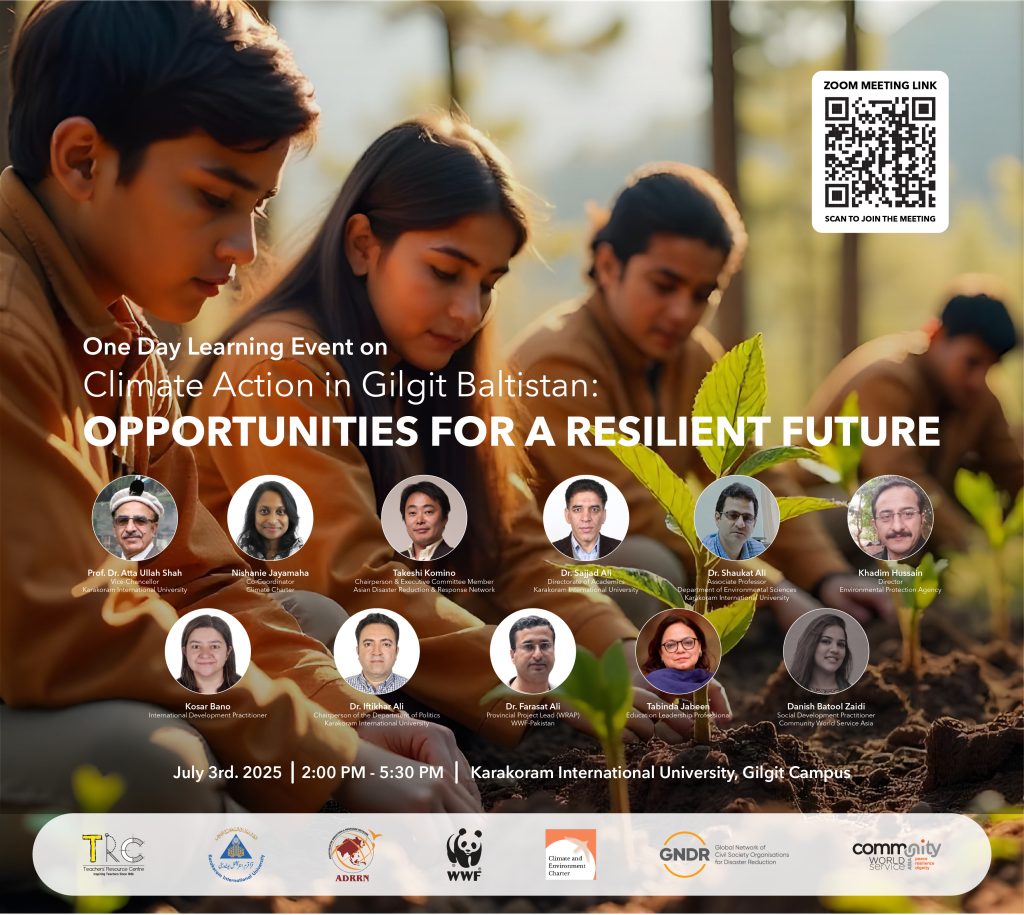
One Day Learning Event on Climate Action in Gilgit Baltistan: Opportunities for a Resilient Future


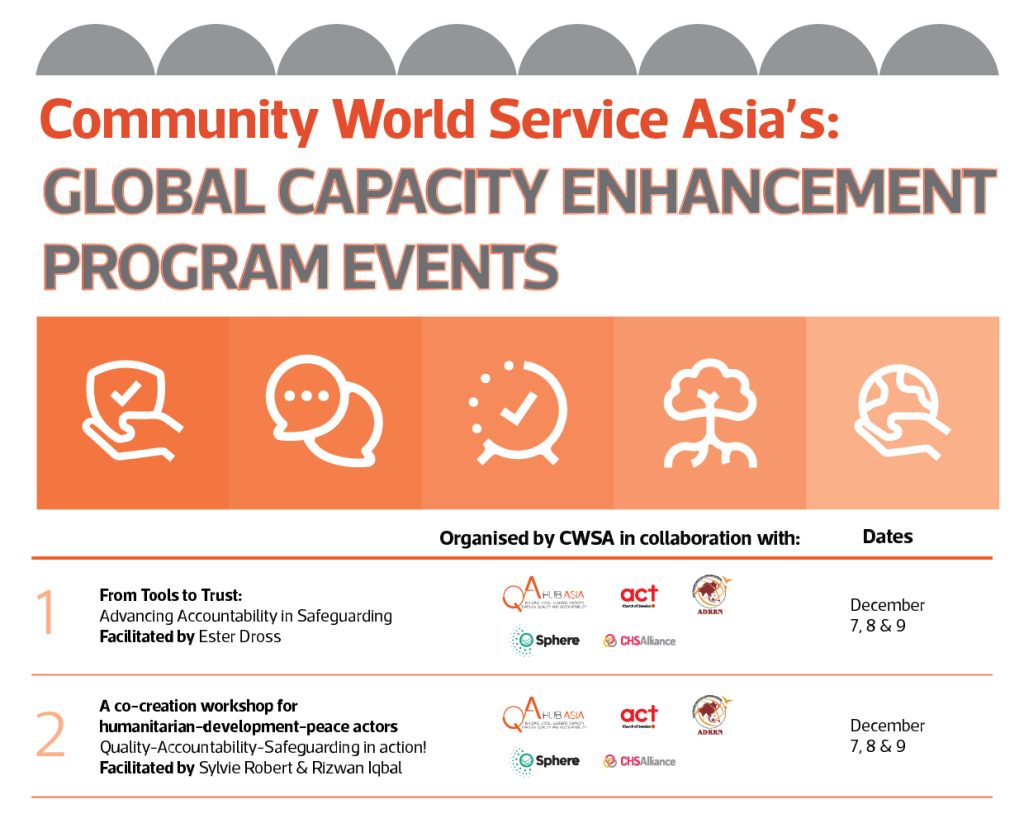
Centre for Social Development and Social Entrepreneurship University of the Punjab, in collaboration with the Social Welfare Training Institute, Department of Social Welfare and Bait ul Maal Government of the Punjab, and Community World Service Asia, is pleased to announce one-month short course on NGO Management.
When: 22nd May- 15th June 2023 (Classes are scheduled between Monday to Thursday in the second half of each day per week)
Where: University of the Punjab, Lahore, Pakistan
Language: Urdu and English
Fees: PKR 15,000
Interested Applicants: Click here to register
Last Date to Apply: 12th May 2023 (Applications will be selected on a first come, first serve basis)
Background and Objectives:
The last thirty years have witnessed an extraordinary growth in the NGO sector in many parts of the world, becoming a prominent part of the global civil society and are now significant players in promoting and protecting human rights, environment issues and social development causes at local, national and international levels. Consequently, there is an increasing need for building familiarity and skills on management of NGOs. Through this course, participants will:
Target Audience:
This course is designed for fresh graduates interested in joining the sector, Social Welfare Department staff, NGOs staff and other people interested in understanding the working of development sector organizations. Women and students are highly encouraged to apply; a special incentive may be given.
Teaching Methodology:
Instructors

Mr. Muddassir Riaz Malik has over 20 years of experience serving in the public sector in varying capacities. He received the Australia Awards Scholarship in 2015, through which he graduated with a Master of Public Policy from the Crawford School of Public Policy, Australian National University, Canberra, specializing in policy impact evaluation, research and economic cost benefit analysis. He currently serves as the Director General Department of Social Welfare and Bait ul Maal Government of the Punjab. Previously, he has held the posts of Director General Punjab Food Authority, Deputy Commissioner Lahore, Commissioner DG Khan and Additional Secretary (Admin) Planning and Development Department.

Dr Tahira Jabeen with a doctorate in ‘Child Protection Policy’ from Australian National University, Dr. Tahira Jabeen has over 25 years of work experience as an academic, independent researcher, trainer and consultant with government, and national and international NGOs and multilateral organizations in the areas of child protection, children and human rights, qualitative research, social entrepreneurship, social development and civil society. In addition to her duties as Associate Professor and Director of the Centre for Social Development and Social Entrepreneurship at University of the Punjab, she currently also serves on Board of Studies of Lahore College Women University and University of Home Economics, Lahore, as well as on the editorial board of the journal ‘Child Maltreatment: Research, Policy and Practice.’

Mr. Irshad Waheed has been associated with social development/community development in the public sector for the past 25 years in the domains of women protection and development, child protection, rehabilitation of disabled persons and senior citizens’ social policy formulation. He has been a part of various teams of the Department of Social Welfare and Bait ul Maal Government of the Punjab and currently serves as Director General of the Punjab Women Protection Authority where he oversees the execution, monitoring and coordination of the Women Protection System. Mr. Irshad is also part of the visiting faculty at Social Work Department, Punjab University.

Mr. Irfan Mufti, a well-known human rights defender and peace activist in Pakistan and South Asia, holds a Master’s Degree in Social and Cultural Anthropology and M.Phil in American History. Currently serving as Deputy Executive Director of a six-country development and advocacy consortium South Asia Partnership-Pakistan (SAP-PK), he has previously led Global Call to Action Against Poverty (GCAP) for three years. Mr. Irfan has worked extensively in the community development field through facilitation of community groups, NGOs and networks, organizational planning, humanitarian assistance and advocacy campaigns. He co-authored two books and remains a regular contributor to political economy pages of national English dailies and other research journals.

Dr. Izhar Hashmi a graduate of Kind Edward Medical College, Institute of Public Health and AMA, Dr. Izhar Hashmi is currently working as Director (Program & Operations) at Punjab Welfare Trust for the Disabled (PWTD). He has remained engaged in varying capacities with Akhuwat, Waseela Foundation, Al-Noor Umer Welfare Trust and Society for Education and Technology. In the public sector, he has been associated with SWD KPK and Punjab, Special Education Department Punjab and Punjab Youth Development Program. Dr. Izhar Hashmi has developed innovative models and solutions for the inclusive education, especially with learning difficulties and disabilities through different interventions. He has delivered trainings on soft skills, entrepreneurship, strategic negotiation skills, SDGs and community development.

Mr. Safdar Abbas is a sociologist and social development professional with more than 16 years of experience. He has contributed to more than fourteen national and international research projects from conception to execution. He has been actively involved in policy analysis, project management, capacity building and advocacy through communication various levels. On the academic side, he is a regular contributor to high impact HEC journals and has so far published fourteen articles on a wide range of topics including human rights, community development, violence against children, and women rights/empowerment. His professional experience coupled with the national and international level trainings on various themes have enabled him to develop viable public sector policies, programs, and projects.

Ms. Ayesha Hassan is the Associate Director at Community World Service Asia with a diverse experience project implementation on Quality and Accountability (including Safeguarding, PSEAH, Complaints Response Mechanism), Gender, Livelihoods (including food security with focus on DRR), Education, and Participation. She is a trainer, advisor and voice for Quality and Accountability standards including Core Humanitarian Standard, Do No Harm Approach, and Sphere Standards. Ayesha is hands on in fundraising and program growth, overseeing the development of proposals and donor compliance. She develops program strategies for various programs under implementation while she has also facilitated the process of developing a 10-year strategy for DRR, livelihood and democratization.

Mr. Sohail Muhammad Ali is a high-performing research and capacity-building specialist and trainer with expertise in research, training and development to maximize human resource outputs in social development and education sectors. He is an influential and inspirational leader with excellent human capital development skills. Mr. Sohail has the experience of working in South Asia, Africa and Europe. He has conducted professional development workshops and capacity building sessions. He has served as a national and international consultant for organizations including Leonard Cheshire (LC) UK, World Bank, USAID, Care International, UNICEF, Aga Khan Rural Support Program (AKRSP), Academy for Educational Development (AED), Aga Khan Foundation (AKF), Transparency International, Lead Pakistan, British Council Pakistan, Human Resource Development Network (HRDN), and others.

Ms. Tooba Siddiqi is an experienced Engagement Manager with over 10 years of experience in partnership management, advocacy, youth mobilization, community- led campaigning, fundraising, and resource development. A tech-savvy, human resource manager with a demonstrated history of remotely managing large teams from diverse geographical and ethnic backgrounds. She is a strong community and development professional trained in Management Sciences and Human Resources Management from the University of the Punjab, Lahore. In the past year with Community World Service Asia, she has played a significant role in pushing the Quality and Accountability standards with local NGOs as well as regional NGOs.
When: 19th- 21st June 2023 (arrival at venue on 18th June 2023 before 7 pm)
Where: Murree, Punjab
Language: Urdu and English
Interested Applicants: CLICK HERE TO REGISTER
Last Date to Apply: 25th May 2023 (incomplete applications will not be entertained)
Leading in Complexity and Ambiguity training will be directed at the senior staff of NGOs. It will use the ‘Authentic Leader’ model and provide opportunities to the participants to reflect on their leadership style and its relevance and effectiveness. It will give them knowledge on leadership competencies based on research with contemporary leaders. They will also have opportunities for practicing and sharpening their personal leadership skills and competencies. Methodology of this training includes self-reflection and analysis, working with buddies, exercises. These will be interspersed with lectures by the external trainer and experience sharing by prominent leaders from the development and corporate sectors. Coaching and mentoring support will be provided to 30% of participant organisations to help them apply their learning.
Training Objectives
By the end of this workshop, you will be able to:
Methodology
The approach used in this training is the ‘Blended Learning’ approach developed by CWSA’s Capacity Enhancement Project (CEP) in its previous phases. The approach is participatory and needs-based in nature. It consists of selection of participants from diverse organisations at different levels, content and methodology designed with and based on the needs of the training participants, use of experienced and knowledgeable trainers, flexible content and methodology during the training, development of action plans and follow up refreshers and coaching and mentoring support.
Number of Participants
Selection Criteria
Fee Details
Trainer
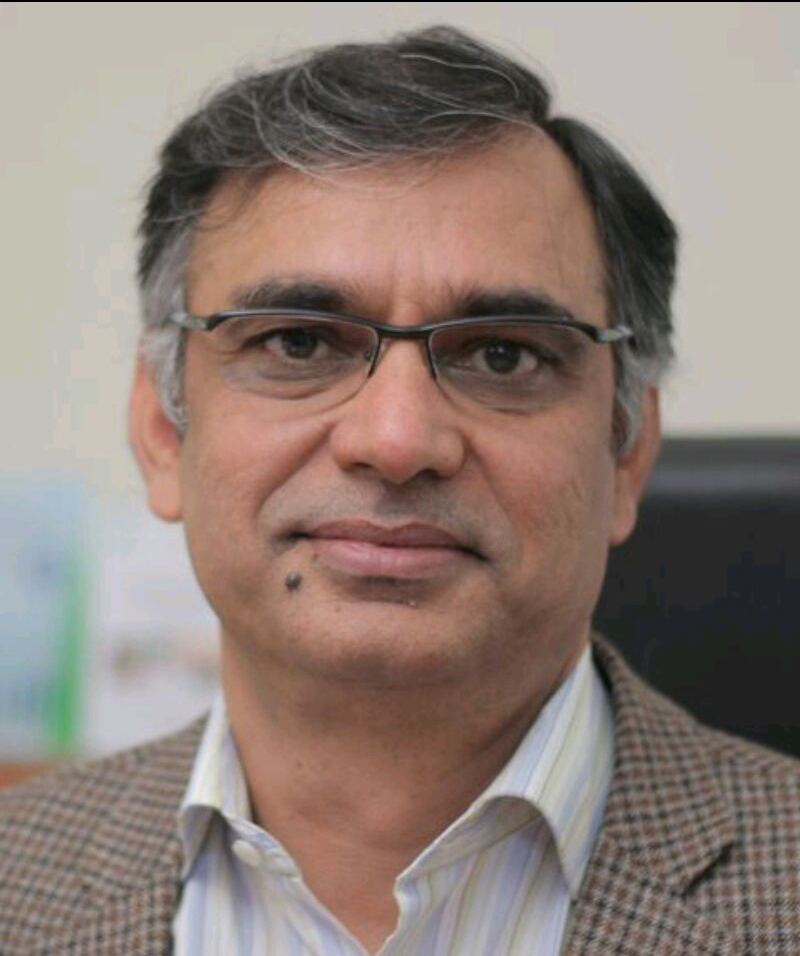
Mr. Arif Jabbar is the Country Director of Water Aid Pakistan. Mr. Arif is a leadership Coach and is currently coaching a number of staff members in public and private institutions. Mr. Khan holds an M.Phil. degree in Public Policy from the National Defence University Islamabad and was awarded with the President’s Gold Medal. He also holds a Master’s Degree in Engineering (Water Resource Development) from the Asian Institute of Technology, Bangkok. Mr. Arif is an Eisenhower Fellow wherein he studied the “Americans with Disabilities Act” during his Fellowship. He was the Chief of Party of USAID Ambassador’s Fund Grant Programme and has served Oxfam International as the Global Head of Humanitarian Campaigns, Regional Humanitarian Coordinator for Southern Africa and East Asia, Country Director in Pakistan and South Africa, in addition to holding other portfolios. He also served as the Country Director, Pakistan with Voluntary Service Overseas –VSO, Regional Grants Manager, Asia with Child fund International, Director Programme Operations, Sri Lanka with Save the Children and Director Operations, Market Development Facility with The Palladium Group.
Community World Service Asia (CWSA) is a humanitarian and development organization, registered in Pakistan, head-quartered in Karachi and implementing initiatives throughout Asia. CWSA is member of the Core Humanitarian Standard (CHS) Alliance, a member of Sphere and their regional partner in Asia and also manages the ADRRN Quality & Accountability Hub in Asia.
Every year Pakistan faces a surge of Dengue outbreak in most of its provinces. With the floods of 2022 leaving lakes of stagnant water and with inadequate drainage systems, the spread of the disease was inevitable to say the least.
One of the areas worst affected by dengue each year is Okara, a district in Punjab province. “Many remote villages in Okara were hit by the outbreak. As the local communities were combating the disease using local and traditional remedies, the Health and Welfare Society planned a community-centred strategy to mobilise communities affected by the disease,” shared Shabana Aamir, a staff member leading Health and Welfare Society (HWS), a local NGO based in Okara.
“We explained principles of hygiene and sanitation through sharing local examples and fully engaged the communities by developing mobilisation teams. The teams, including staff of HWS and members from communities, went door to door to hold awareness sessions and sensitising families on how to prevent the spread of dengue and treat those affected,” explained Shabana.
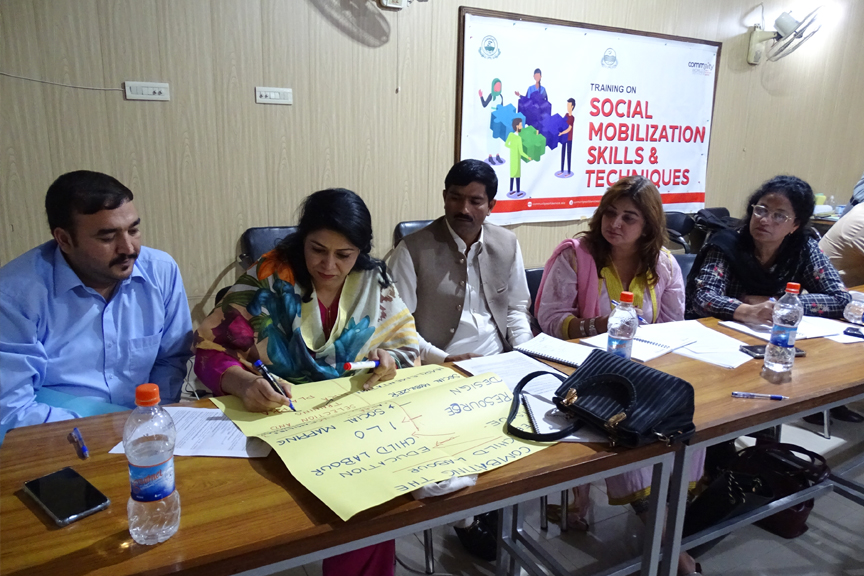
Shabana was one of twenty-nine participants at a training conducted by Community World Service Asia on ‘Social Mobilisation Skills and Techniques’, held in Lahore in September 2022. Organised in collaboration with the Social Welfare Department Punjab and Social Welfare Training Institute this capacity enhancement session focused on raising knowledge on basic concepts of social mobilisation and jointly analysed the various levels of ongoing and possible community engagement. Shabana attributes her team’s success in combatting dengue to the skills and learning she acquired at the training and how she shared it ahead. “I initiated campaigns on a regular basis with the help of the training tools and methodologies I had learned during the training, and was able to reach out to people for implementation of ideas by the help of The Johari Window Model.”
A wide range of engaging exercises and activities were conducted during the training to not only further improve mobilisation skills of participants but also help them learn new tools and techniques and how to apply them in varying contexts. Ghulam Fatima, General Secretary of Johar Welfare Foundation since 2013, shared how one particular group activity, named ‘Zoom and Re-Zoom’, helped improve her problem-solving skills. “In this activity, we had to create a unified story from a set of sequential pictures that were randomly ordered and handed out. We were not allowed to show our picture to anyone. This activity boosted our level of patience, communication, and perspective in order to recreate the story’s sequence. As a result, we learned that it takes time to uncover and understand problems before acting out on them through effective communication and problem-solving skills.”
Fatima applied a social mobilisation tool called Behaviour Change Communication (BCC)ⁱ that she learnt during the training when she engaged with the communities that her organisation serves.
“Initially upon applying BCC in the community, mobilisation became challenging owing to insufficient time, lack of resources and slow adaptation by the community. To overcome the challenge, key persons from the community including retired teachers, health workers and shopkeepers, were invited to our office to become our focal points and representatives in the community. Through our collective effort, we were able to encourage individuals to adopt positive, healthy behaviours in the community including street sanitation, garbage collection at proper points, typhoid vaccination, and polio campaigns.”
A few months after the training, a follow-up session was conducted in December with all the participants of the said training to provide a platform for experience sharing, challenge identification, mutual learning and a chance to attain technical support from CWSA. “The follow-up initiative has proven to be productive as CWSA encourages organisation to implement and achieve positive outcomes through the efficient use and application of available tools and methodologies shared during the training. We hope to be part of future capacity enhancement events which will help us derive solutions for challenges faced on ground and encourage us to place communities at the centre of every response,” concluded Shabana.
ⁱ Behaviour Change Communication is an interactive process of any intervention with individuals, group or community to develop communication strategies to promote positive health behaviours which are appropriate to the current social conditions and thereby help the society to solve their pressing health problems.
When: 13th-15th March 2023 (arrival at venue on 12th March 2023)
Where: Murree, Punjab
Language: Urdu and English
Interested Applicants: CLICK HERE TO REGISTER
Last Date to Apply: 15th February 2023 (incomplete applications will not be entertained)
Training Objectives:
By the end of this workshop, you will be able to:
Background
Report writing is a powerful communication skill and is a key requirement for NGOs and CSOs to capture their activities as well as ensure effective monitoring and accountability. It may be written for a wide range of audiences from donor and government departments to internal management and partners. In this three-day report writing workshop, you’ll learn how to apply timeless report-writing principles to any scenario. You’ll learn to craft each report around a concise high-level message, followed by logical ordered and support points. You’ll learn how to decide on the scale and scope of technical detail to include, what to do about business jargon, and what to do when new facts. How to change the report angle as well as use of infographics and PPT to make your it clearer and more effective.
Number of Participants
Selection Criteria
Fee Details
Trainers:
Ms. Danish Batool Zaidi

Ms. Batool is associated with Social Development Sector since 2011, She has been working with number of National and International Organizations in Pakistan. Her core expertise is mainly related to Organizational Capacity Development, Public Health, Local Governance, Sexual Reproductive Health Rights, Sustainable Development Goals framework agenda, Gender Justice, Children/Adolescents, and Youth Leadership/empowerment for social change.
In collaboration with Indus Health Network and provincial Governments, she developed the manual/curriculum for adolescents and teachers of government secondary schools titled, Adolescent Health and Leadership Course for Kiran Sitara Students and Teachers. The manual was approved by the Education Departments of Sindh and KPK and consisted of topics such as Leadership, Communication Skills, Health and Nutrition, Child Protection, and Social Action Project Planning. She also organized various stakeholder’s groups to implement the Effective Community Development approach for engaging communities for sustainable change. She also served as Global Call for Action against Poverty Youth Coordinator while coordinating with 53 PARC (People’s Awareness and Rights Committees) Networks in 15 districts of Southern Punjab.
She developed Behaviour Change Models and especially focused on the use of media as a change medium. She appeared in several TV programmes, raising voices on citizens’ rights, active citizenship, women’s rights etc. She also ran radio campaigns on Early and Child Marriages, Family Planning, Water and Sanitation, Violence Against Women and Youth Friendly Health Services.
She recently developed the training manual on “Prevention of Violent Extremism in South Asian Countries” in collaboration with University of Peshawar. She represented Pakistan as a youth/women’s right activist on many national and international platform, in 2020, Seven of position papers along-with digital posters have been selected for World Congress on Occupational Safety and Health by Canadian Government.
Syeda Yumna Hasany

Yumna has over nine years of experience in the development sector, in the areas of program development, project management, and communications. She completed her master’s degree in public policy and governance in 2019, from Australian National University, Canberra, under the Australia Award Scholarship Program. She is a fellow of the Legislative Fellowship Program for India and Pakistan, organized by the U.S. Department of State, for policymakers and development practitioners. Currently, she is leading the Program Development Unit at Community World Service Asia.
She is a development consultant and the former manager of the health program, at a local non-profit organization-Akhtar Hameed Khan Resource (AHKRC). AHKRC is working in areas of reproductive health, education, and entrepreneurship in the urban slums of Pakistan. Previously she has worked in different NGOs such as Devolution Trust for Community Empowerment (DTCE) and LEAD Pakistan working in areas of women’s leadership, health, and rule of law.
She has also been affiliated with Radio Pakistan since 2010, working for Planet 94 and FM101 radio station as a radio host, voice-over artist, and content writer, hosting shows on literature, art, and social issues.
She is also a trainer in communications and leadership. Currently, she is the lead trainer and mentor for the Girls4Girls program an initiative of the Harvard Kennedy School of Government with a mission to “Empower Girls”.
Community World Service Asia (CWSA) is a humanitarian and development organization, registered in Pakistan, head-quartered in Karachi, and implementing initiatives throughout Asia. CWSA is a member of the Core Humanitarian Standard (CHS) Alliance, a member of Sphere and their regional partner in Asia, and also manages the ADRRN Quality & Accountability Hub in Asia.
When: 23th– 25th May 2022 (arrival at the venue on 22rd May 2022)
Where: Murree, Punjab
Language: Urdu and English
Interested Applicants: Click here to register
Last Date to Apply: 5th May 2022 (incomplete applications will not be entertained)
Training Objectives: Through this training, you will be able to:
With the advent of globalization, managers find themselves in a far more competitive environment within which they must secure resources for the growth and sustainability of their organizations and programs. This three-day workshop on resource mobilization aims at building capabilities of individuals/organizations in the domain of resource management. It also provides the skills for conceptualizing, designing, implementing and evaluating an efficient resource mobilization strategy. The training will provide an opportunity to acquire new contacts, build networks and partnerships and share your experience with others engaged in resource mobilization
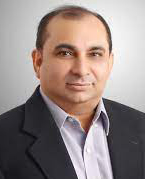
Facilitator/Lead Trainer: Mr. Sohail Muhammad Ali is a high-performing research and capacity-building specialist and trainer with expertise in research, training and development to maximize human resource outputs in social development and education sectors. He is a respected & proven advisor to non- government organisations, and has played an active role in providing guidance on research and development functions to promote and innovative solutions to social developmental challenges. He is an influential and inspirational leader with excellent human capital development skills. Mr. Sohail has the experience of working in South Asia, Africa and Europe. He has conducted professional development workshops and capacity building sessions. He has served as a national and international consultant for organizations including Leonard Cheshire (LC) UK, World Bank, USAID, Care international, UNICEF, Aga Khan Rural Support Program (AKRSP), Academy for Educational Development (AED), Aga Khan Foundation (AKF), Transparency International, Lead Pakistan, British Council Pakistan, Human Resource Development Network (HRDN), and others.
Community World Service Asia (CWSA) is a humanitarian and development organization, registered in Pakistan, headquartered in Karachi and implementing initiatives throughout Asia. CWSA is member of the Core Humanitarian Standard (CHS) Alliance, a member of Sphere and their regional partner in Asia and also manages the ADRRN Quality & Accountability Hub in Asia.
When: 17th -19th February, 2022
Where: Murree, Punjab, Pakistan
Application Deadline: 20th January, 2022.
Register: Click here
Covid-19 has challenged the traditional leadership style and forced leaders to adapt their leadership approaches in dealing with the uncertainties brought about by the virus and its effects. NGO leaders have also been faced with dilemmas and ambiguities that they have never been exposed to.
Leading in Complexity and Uncertainty training will be directed at the senior staff of NGOs. It will use the ‘Authentic Leader’ model and provide opportunities to the participants to reflect on their leadership style and its relevance and effectiveness in the context of Covid-19. It will give them knowledge on leadership competencies based on research with contemporary leaders. They will also have opportunities for practicing and sharpening their personal leadership skills and competencies.
Methodology of this training includes self-reflection and analysis, working with buddies, exercises (but considering social distancing). These will be interspersed with lectures by the external trainer and experience sharing by prominent leaders from the development and corporate sectors. Coaching and mentoring support will be provided to 30% of participant organisations to help them apply their learning.
Objectives
At the end of the training, participants will:
Methodology
The approach used in this training is the ‘Blended Learning’ approach developed by CWSA’s Capacity Enhancement Project (CEP) in its previous phases. The approach is participatory and needs based in nature. It consists of selection of participants from diverse organisations at different levels, content and methodology designed with and based on the needs of the training participants, use of experienced and knowledgeable trainers, flexible content and methodology during the training, development of action plans and follow up refreshers and coaching and mentoring support.
Number of Participants
18-22 participants will be selected for the training. Female staff and those with disabilities and from ethnic/religious minorities are encouraged to apply. Preference will be given to participants from organisations based in underserved areas.
Selection Criteria
Participants will need to arrive at the venue on 16th February 2022.
Training Facilitator
Arif Jabbar Khan, Country Head, Water Aid.

Mr. Arif is the Country head of Water Aid Pakistan. Mr. Khan holds an M.Phil. degree in Public Policy from the National Defense University Islamabad and was awarded with the President’s Gold Medal. He also holds a Master’s Degree in Engineering (Water Resource Development) from the Asian Institute of Technology, Bangkok. Mr. Arif is an Eisenhower Fellow wherein he studied the “Americans with Disabilities Act” during his Fellowship. Mr. Arif is a leadership Coach and is currently coaching a number of staff members in public and private institutions. He was the Chief of Party of USAID Ambassador’s Fund Grant Programme and has served Oxfam International as the Global Head of Humanitarian Campaigns, Regional Humanitarian Coordinator for Southern Africa and East Asia, Country Director in Pakistan and South Africa, in addition to holding other portfolios. He also served as the Country Director, Pakistan with Voluntary Service Overseas –VSO, Regional Grants Manager, Asia with Child fund International, Director Programme Operations, Sri Lanka with Save the Children and Director Operations, Market Development Facility with The Palladium Group.
Webinar on: Complaints Mechanisms
Format: Webinar presentation, discussion
When: 20th January 2022
Time: 2.00 PM-3:00 PM (Pakistan Standard Time)
Where: Zoom – Link to be shared with registered participants.
Register: here
Language: English
How long: 60 minutes
For: Safeguarding focal points, senior managers of national, international and regional NGOs and aid/development networks
Moderator and Trainer: Ester Dross
Background:
CWSA is a humanitarian and development organisation registered in Pakistan, addressing factors that divide people by promoting inclusiveness, shared values, diversity, and interdépendance. CWSA is highly committed towards Accountability to Affected People and people centered aid. Over the last two years, we have offered different webinars, covering various aspects on safeguarding and aiming to raise more awareness on key aspects of accountability such as establishing efficient and transparent complaints systems and protection from and prevention of sexual exploitation, abuse and harassment. Safeguarding is a key pillar to any accountability measures that organizations must integrate into their Programmes and working cycle.
When people we work with or for feel unsafe within their workspace or global environment, this has critical negative impacts on the quality of our work and the objectives we intend to reach. It is therefore important that we are more aware and increase our efforts for a better understanding of the issues at hand.
This webinar is part of a series of 6 one-hour webinars, covering safeguarding, key policies and minimum requirements, Complaints systems, Complaints handling and managing investigations and communication. The last webinar will be dedicated to experience sharing and best practice
Objectives:
This third event follows an introductory session on safeguarding where three organizations shared their experience in setting up a safeguarding framework and an interactive session where participants explored the key policies and guidelines they need to have in place in terms of safeguarding. During this session, we would like to:
Moderator & Presenter:
Ester Dross—Independent Consultant
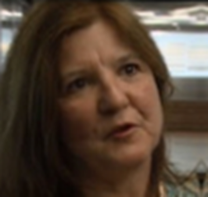 Ms. Dross is an indépendant consultant with over 25 years of expérience, specializing in accountability, prevention of sexual exploitation and abuse, gender and child protection.
Ms. Dross is an indépendant consultant with over 25 years of expérience, specializing in accountability, prevention of sexual exploitation and abuse, gender and child protection.
Ms. Dross has had an extensive exposure to humanitarian certification systems and accountability to affected populations while working with HAP International as their Complaints Handling and Investigation Advisor, later as their Certification Manager. She has been closely involved in the Building Safer Organisations Project since 2005, dealing with sexual exploitation and abuse of bénéficiaires, particularly focusing on gender and child protection. Over the last 6 years and since working as an independent consultant, Ester has been leading a pilot projet for FAO on accountability and gender mainstreaming in emergencies and working with numerous NGOs including ACT Alliance members, supporting and training their staff on gender issues, child